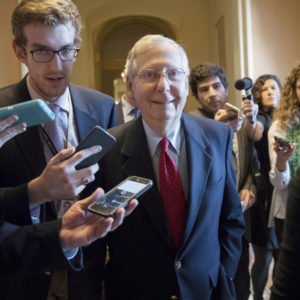With the passage of H.R. 1, the House of Representatives just approved one of the boldest election and campaign reform bills in decades. H.R. 1, also called the “For the People Act,” has been heralded as a sweeping anti-corruption and pro-democracy bill. With provisions to boost youth civic engagement, enact Automatic Voter Registration, Election Day registration, and a small-dollar campaign finance system, H.R. 1 has the potential to transform who gets a say in our democracy.
Yet, Senate Majority Leader Mitch McConnell has already come out in opposition to the Senate companion bill. With voters under 35 set to make up 37 percent of the electorate, but facing a mountain of barriers to voting, I have an idea why McConnell might be opposed to this bill: He’s afraid of young people voting.
In last year’s midterm elections, young people voted in historic numbers, increasing turnout from 20 percent in 2014 to 31 percent in 2018. This incredible turnout should be celebrated, but the reality faced by the 69 percent of young eligible voters that did not — or could not — vote must be examined.
Young people face widespread barriers when it comes time to cast a ballot. For years, Republican state lawmakers have attempted to suppress the voice of college students in every way possible. In 2014, Florida Secretary of State Ken Detzner banned state college and university campuses from serving as early voting sites. A federal judge later ruled that move unconstitutional, saying Detzner’s decision showed “a stark pattern of discrimination.”
In Michigan, young people have to navigate a complex and cumbersome system to cast a ballot, including a requirement to appear in person at a Secretary of State branch or local clerk’s office if trying to vote absentee for the first time. And last year in Texas, a group of students sued the county for not offering any early voting locations for the first week of early voting in Prairie View A&M University, a historically black university, and the predominantly black town of Prairie View. These types of voter suppression are not isolated — they’re part of a coordinated attack in states and districts across the country.
H.R. 1 tackles these suppression efforts head on. By directing institutions of higher education to designate a “Campus Vote Coordinator,” the legislation would give college voters a designated person who would guide them through the complexities of the electoral system and keep them up to date with voting information.
But perhaps the boldest provision in the bill is Automatic Voting Registration (AVR). Young people are naturally transient, changing addresses more than twice the rate of older Americans. This reality is acute for college students who bounce around from a parent’s home, to college, to a home of their own.
With AVR, H.R. 1 acknowledges this problem, creating a system where an eligible voter’s registration information is automatically electronically transferred from government agencies to state election offices and gets updated if the voter moves.
Election Day registration would also directly benefit eligible young people, many of whom juggle multiple jobs and school, to register to vote and cast a ballot on Election Day. Additionally, the bill’s proposed small-dollar campaign finance system would restore power to regular Americans contributing to candidates and campaign, and ensure the voices of millennials, who the Federal Reserve recently said was the poorest generation, are not drowned out by special interests and the super wealthy.
It’s no secret that young people want to be politically active and have their voices heard. As evidence, one need look no further than March For Our Lives. After the tragic shooting in Parkland, Florida, young people across the country took to the streets in one of the largest youth demonstrations in American history to denounce weak gun laws, NRA-bought politicians, and demand change. And with climate change, young activists are targeting lawmakers from both parties, risking arrest, and offering bold solutions to the climate change crisis.
Mitch McConnell is good at one thing: reading the tea leaves. He’s seen how an energized electorate can flip a chamber and usher in lawmakers that reflect America’s younger generations. He’s also seen the headlines and read the polls on how millennials and Generation Z are set to upend our modern political system.
McConnell is afraid of America’s young people. If he didn’t fear young people and their resolve for change, he would be working to eliminate barriers to our electoral system and making voting fair and accessible to all.

